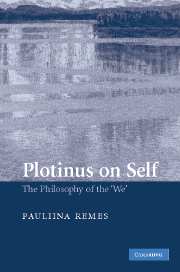Book contents
- Frontmatter
- Contents
- Acknowledgements
- Note on editions and abbreviations
- Introduction
- PART I THE ENDOWED STRUCTURES OF SELFHOOD
- 1 Two lives, two identities: the ontological and anthropological setting
- 2 The conscious centre
- 3 The rational self and its knowledge of itself
- PART II CONSTRUCTING THE SELF: BETWEEN THE WORLD AND THE IDEAL
- Conclusion
- Bibliography
- Index locorum
- General index
3 - The rational self and its knowledge of itself
Published online by Cambridge University Press: 26 October 2009
- Frontmatter
- Contents
- Acknowledgements
- Note on editions and abbreviations
- Introduction
- PART I THE ENDOWED STRUCTURES OF SELFHOOD
- 1 Two lives, two identities: the ontological and anthropological setting
- 2 The conscious centre
- 3 The rational self and its knowledge of itself
- PART II CONSTRUCTING THE SELF: BETWEEN THE WORLD AND THE IDEAL
- Conclusion
- Bibliography
- Index locorum
- General index
Summary
The picture of selfhood emerging from our material is, if not thoroughly, nonetheless emphatically intellectual. The rational soul – and especially its paradigmatic part, the intellect – is identified as the true self, as that which gives us stability and identity. For this reason alone, philosophy of the self must include a description of the nature of intellect and rational capacities. Furthermore, elevating pure reason as a normative ideal has important consequences: it acts as a regulative paradigm and principle for embodied and temporal selfhood. An understanding of the rational powers of the soul will thus also reveal indications of what kind of selfhood is held to be valuable and what kind of functioning and processes are believed to cultivate it.
As such, there is nothing striking in Plotinus' intellectualism. Most ancient philosophers held that the universe has an intelligible structure, and that this structure is divinely beautiful. Striving to become aware of the essential and intelligible order of the universe is a natural inclination and capacity of the human psuchē, and this process brings the soul itself closer to order and beauty, shaping the states of the human soul according to the perfection and order of the universe. Acquisition of knowledge is thus not merely instrumental for rationally organising one's life towards happiness and well-being, but is something that quite literally brings human beings closer to a divine state, to god-likeness.
For Plotinus, self-integration and normatively ideal self-constitution both depend upon rational self-realisation.
- Type
- Chapter
- Information
- Plotinus on SelfThe Philosophy of the 'We', pp. 125 - 176Publisher: Cambridge University PressPrint publication year: 2007



